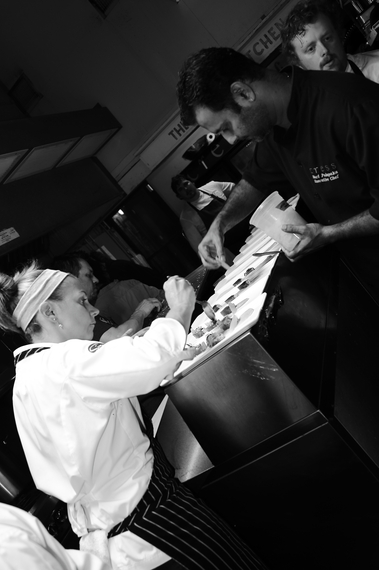Almost 10 years ago, I graduated from culinary school at the age of 39. From the very first day, I was determined to simply be the best student I could be and never really considered having my own restaurant. It may have had something to do with the fact that I was knee-deep in student loan debt as soon as I enrolled. During that time, I was amazed by how lackadaisical so many students were about their amazing opportunity to learn and practice a craft which can change the world. Culinary school, like personal relationships, is what you make of it. No one taught me about using sustainable and local ingredients, but I was fortunate enough to have hailed from a country where neighborhood markets sustain communities. And, refrigeration is barely adequate. So, it was imperative to buy only what one needed for a day or two, at best.
When we opened Cress, I couldn't imagine doing things any other way. Since the James Beard Foundation Boot Camps, my roles on the Chef Action Network (CAN) and the goFLA (Greater Orlando Food Leaders Alliance) movement, I have become deeply involved in trying to share with others my passion and growing knowledge about how to practice the craft of professional cooking as thoughtfully as possible. I've discovered that there seems to be a real yearning among students and teachers in culinary programs to better understand and embrace sustainable practices. And although some of the yearning may come from political and administrative leveraging, there is also sincerity and desperation in the interest. As a chef and educator, I am obligated to stay updated myself and in turn, share everything I can to my staff and guests though the manner in which I practice my craft and business. That should be an obvious expectation, but how can veteran chefs better inspire the young culinarians of today and chefs of tomorrow lead and sustain the charge for a better global food system tomorrow?
Many well-known chefs are already doing significant work and give selflessly of their knowledge, time, energy, and even resources. I am clearly not a veteran chef (this may explain why I cook every dish as if it might be the last one I do), but my seniority stems from being a career academic and a hands-on chef.
Here are some of the ways in which veteran and inspired chefs can inspire the next generation of culinarians to bear the torch of positive change:
1. Practice honestly, that which we are preaching. Ultimately, we have no business pointing fingers at the broken pieces of the global food system if we are not ourselves beacons of integrity and hope. The youngsters who look up to us need to feel secure that their trust is justified.
2. We have to really understand the economics of the constraints and imagine ways in which we can best communicate that to the next generation of chefs because the quantitative projections are only as good as the models. The chefs of tomorrow need to know that our predictions of problems and solutions will be reasonably aligned with the realities of tomorrow.
3. If our proposed solutions to some of the problems with the global food system are based on encouraging greater and seamless use of local and sustainable ingredients, then we have to be equipped with a set of well thought-out reasons for why that approach is contained in the best possible and feasible solutions. Teaching mathematics is easy because the solutions are verifiable. A similar approach is needed for activism related to food policy and action. We have to be able to justify our reasons for how things should be rather than use the "because I said so" or "it's the right thing to do" approach.
4. Assuming that the young chefs of today are inspired by a passion for cooking, the promise of a successful career, and the possibility of fame & glory in the future, we must prove to them that those goals can become realities only by being grounded in the basics of technique and having a sincere investment in constantly improving the resources which sustain the profession.
Ironically, as much as science has helped us be prolific (and consequently, resource-depleting) as a species, in most parts of the world, science may have to take a backseat to good old-fashioned common sense and an embracing of the "best" human values to turn the tide of change for the positive.
